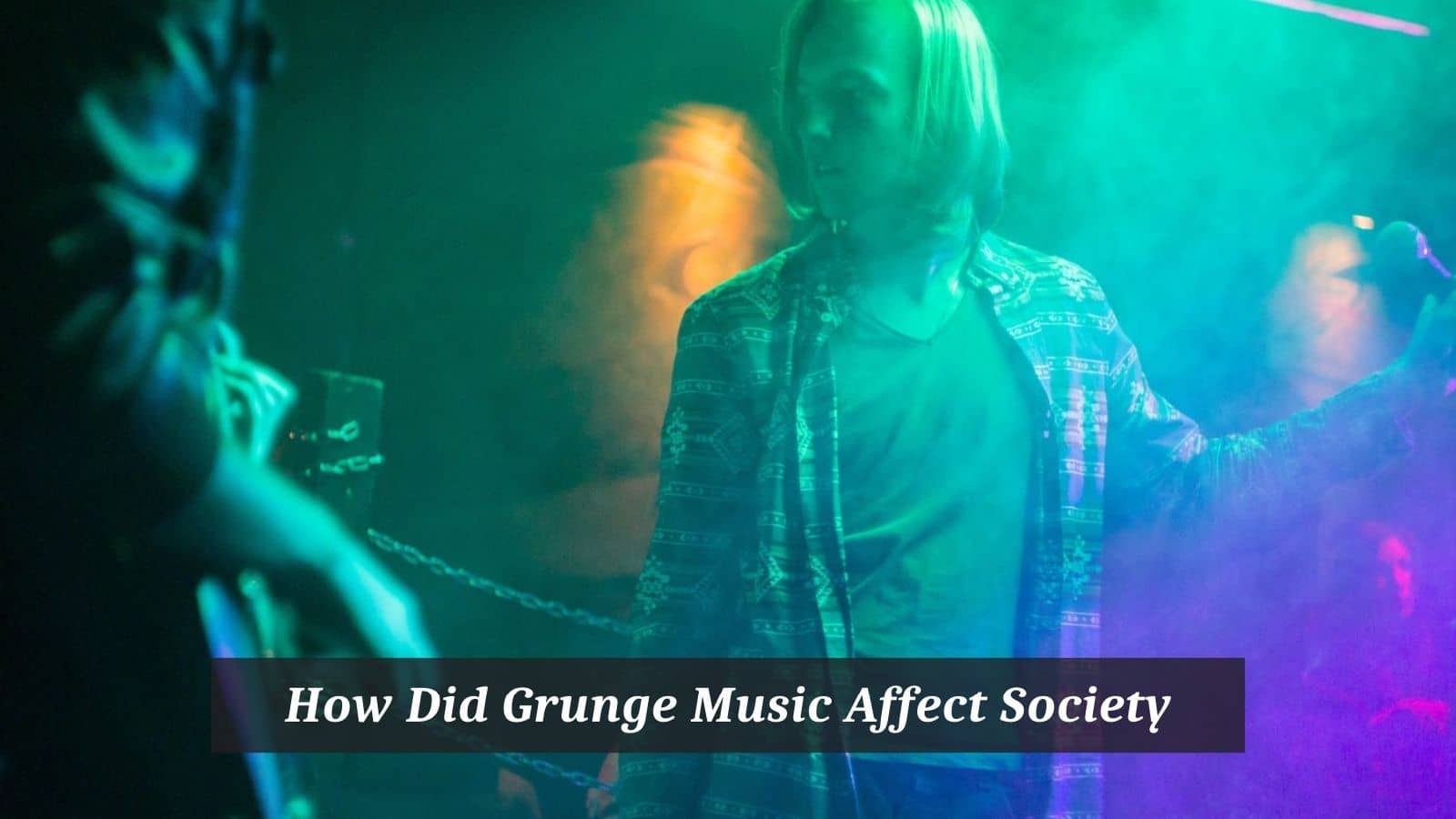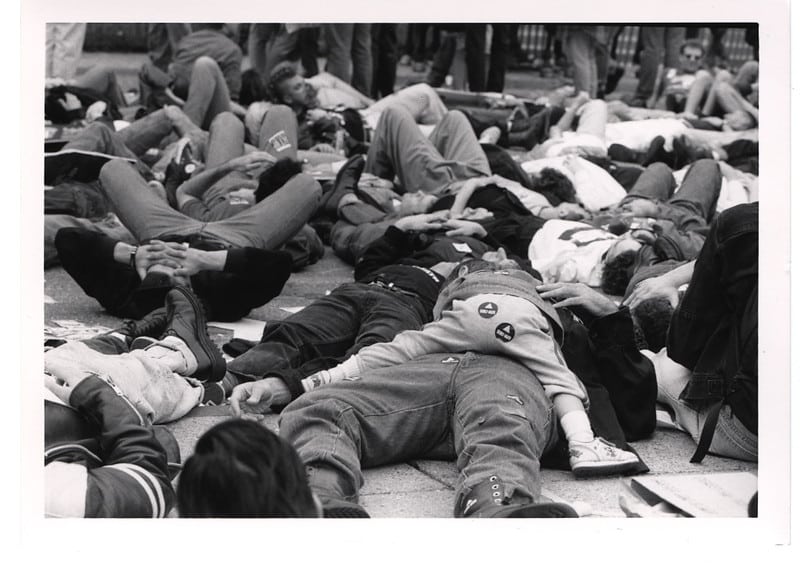
Music has an undeniable influence on us as humans. Some songs make us sad; others make us happy; others we associate with memories—good or bad. Music is a coping mechanism.
For example, think about working or protest songs related to folk music. The music gave people a voice to express their feelings and acknowledged their frustration.
Grunge music affected society on numerous levels—it addressed society’s obsession with over-commercialism, such as slavishly following fashion trends and buying into the hype about new and flashy products.
Sometimes the music also highlighted mental health issues such as depression and suicidal thoughts.
How Did Grunge Music Affect Society
Effects on Fashion
One could label grunge fashion as ‘anti-fashion,’ much like the anti-art movement, which featured dadaism—the art rebelled against what society considered ‘good’ and ‘bad’ art and the associated gatekeeping.
Grunge fashion was laidback and went against ‘accepted’ fashion norms by featuring the iconic ripped and faded ripped jeans worn by men and women alike.
Another staple was flannel shirts and T-shirts with outdated logos: the style aimed to be comfortable and low-budget—a remnant of punk’s DIY influence on grunge. Black combat-style boots like Dr. Martens were popular footwear, which washed over into the goth scene.
Because grunge fashion was oriented towards anti-consumerism, thrift and army surplus stores were the go-to places for seeking out clothes. Oversized sweaters and (sometimes holey) cardigans were also very popular anti-fashion items.
Because grunge followers eschewed going to brand stores, they started to lose money, so of course, there was a rise in grunge high-end fashion in the fashion houses of the world. The point of grunge fashion was to be comfortable.
Grunge fashion was also gender neutral; men and women wore shapeless garments and muted colors that did not stereotypically ‘look’ masculine (blue, for example) or feminine (pink, to mention a stereotype).
Effect on General Society
Grunge was also a catalyst for giving a voice to the social issues of the 1990s. The 1980s in America was a strange landscape filled with conservatism, consumerism, and acquiring wealth.
The Silicon Valley boom in California produced the microchips personal computers required, and they became everyday household items. Young professionals focused on making money, spending it on high-end consumer goods, and looking good.
The AIDS crisis of the 1980s also made people more conservative about their attitudes toward sex—safe sex and monogamy became the norm.
The 1980s, known as the Reagan Years, left many youth and young adults, who did not chase the yuppie dreams, disillusioned and downright angry. Grunge is sometimes described as ‘angry,’ ‘sad,’ and ‘depressed.’
Artists did not shy away from expressing these feelings in their music. However, Grunge musicians felt isolated and forgotten by society because they would not listen to their concerns about mental health issues, fears, hopes, and dreams.
Grunge’s Anti-Conformity Ethos
Grunge fashion was set against consumerism. However, along with anti-consumerism came anti-conformity. Grunge musicians wanted acceptance—not only for themselves but also for other groups and minorities.
Grunge music gave a voice to the forgotten and poor. Reagan’s stance on the AIDS crisis was resoundingly quiet: he only mentioned it in September 1985 when a reporter asked about it at a news conference, and he only gave a speech about it in 1987.
AIDS was first discovered in 1981 already, and by 1987 20,849 out of 36,058 Americans died due to AIDS-related illnesses (source).
LGBTQ+ Rights
In her book Grunge: Music and Memory, Catherine Strong mentions a fundraiser that “opposed the proposed institutionalized discrimination against gays and lesbians,” where Nirvana headlined.
The discrimination was known as Oregon’s Measure 9 bill, which was set to destroy LGBTQ+ rights in the state. The mini-concert-fundraiser took place on 10 September 1992 at Portland Meadows and included other bands such as Helmet, a metal band, and Calamity Jane, an all-female punk band.
The homophobic bill, and those that followed it, also failed, and Nirvana’s participation in the concert fundraiser was part of the core that would jumpstart Oregon’s LGBTQ+ rights movement.
Acknowledging the Plight of Women (Somewhat)
Grunge’s attitude of railing against underrepresentation and discrimination also included standing up for women’s rights. Unlike the rock bands of the 1960s, who saw women as ‘décor’ and objects, grunge did not use sexist lyrics.
On a side note, as welcoming grunge was to women’s rights and equal representation, it also had a dark, racist, and misogynistic side. Tina Bell, referred to as the Godmother of Grunge, is mostly forgotten today in the discussion of the development of grunge during the 1980s.
Grunge advanced the feminist perspective, but only marginally. For example, Pearl Jam’s Daughter is written from a woman’s perspective.
Nirvana participated in a fundraiser on 19 April 1993 at San Francisco’s Cow Palace to raise awareness and funds for the rape victims in Bosnia-Herzegovina. The proceeds from the tickets sold went to the Tresnjevka Women’s Group in Zagreb to assist rape victims from all backgrounds (source 1, source 2).
Standing Up for the Underdog
Grunge was also an outlet for Generation X (Gen X) youth and young adults to express their concerns about the social ills around them. Grunge also gave a voice to fragile males to voice their concerns. We’re not talking about fragile masculinity as evinced nowadays in misogynistic, aggressive, harmful, and toxic behavior by so-called ‘alpha males.’
We’re talking about males doubting themselves and their masculinity and what it means to be a man in today’s society. Grunge gave men a voice to speak up through their songs—the virile, conquering men of hair metal became discredited.
Grunge rebelled against preconceived ideas that ‘boys don’t cry’ and that men, too, can have feelings, hopes, and dreams. Masculinity is diverse, and grunge musicians showed that men could also talk about their feelings without being judged.
Conclusion
Grunge may have lasted only a short while, but its impact on society would echo throughout the coming years. For me, the standout effect on society is how grunge subverted the ideas of conventional sexual attractiveness and de-sexualizing the human body.
Grunge also gave a voice to a generation fraught with the aftermath of ‘Reagonomics,’ consumerism, and breaking down stereotypes giving people freedom of expression.


